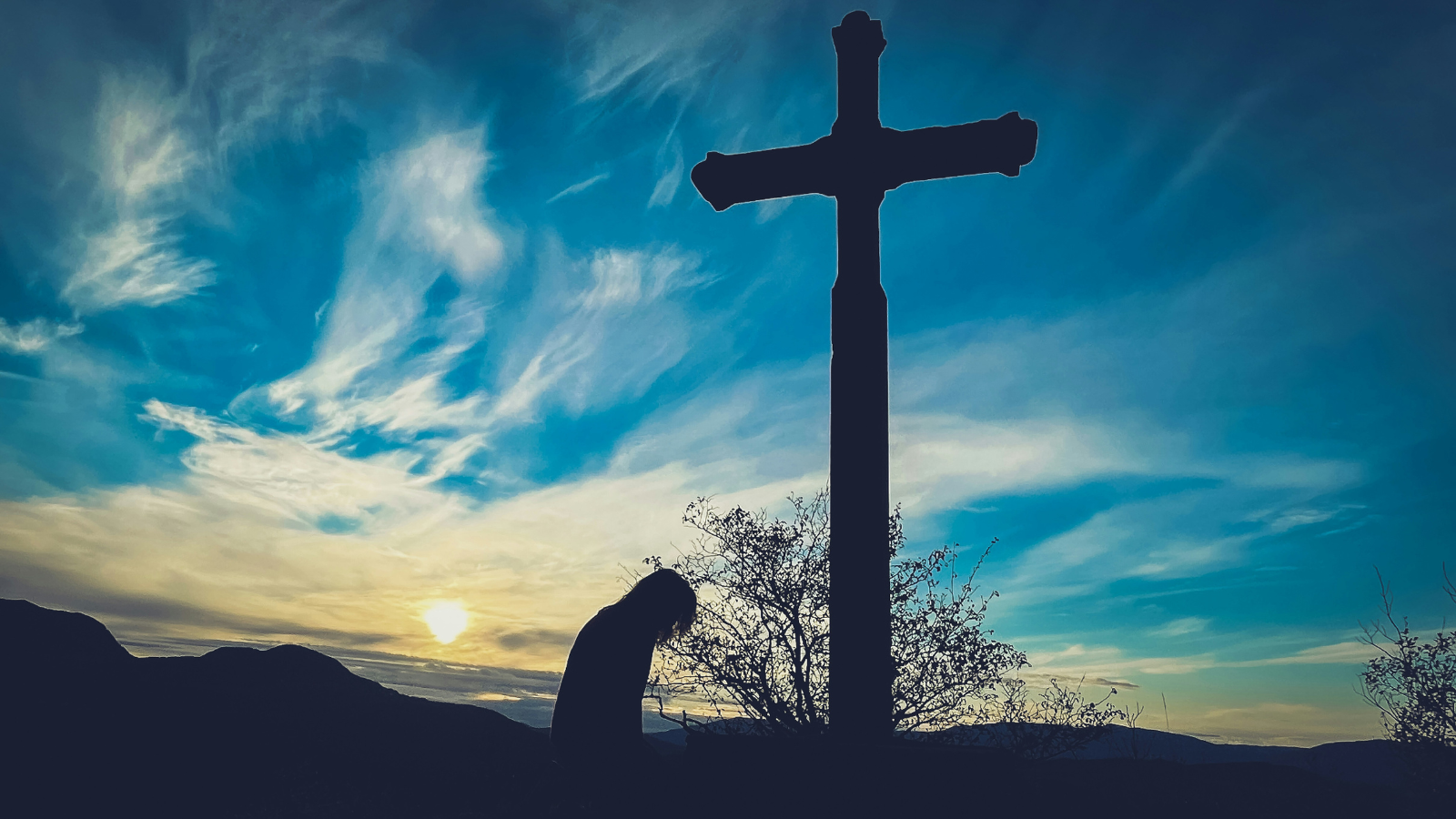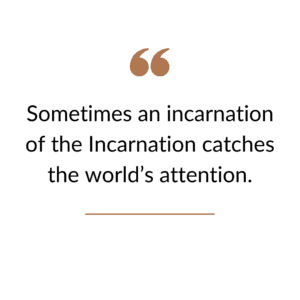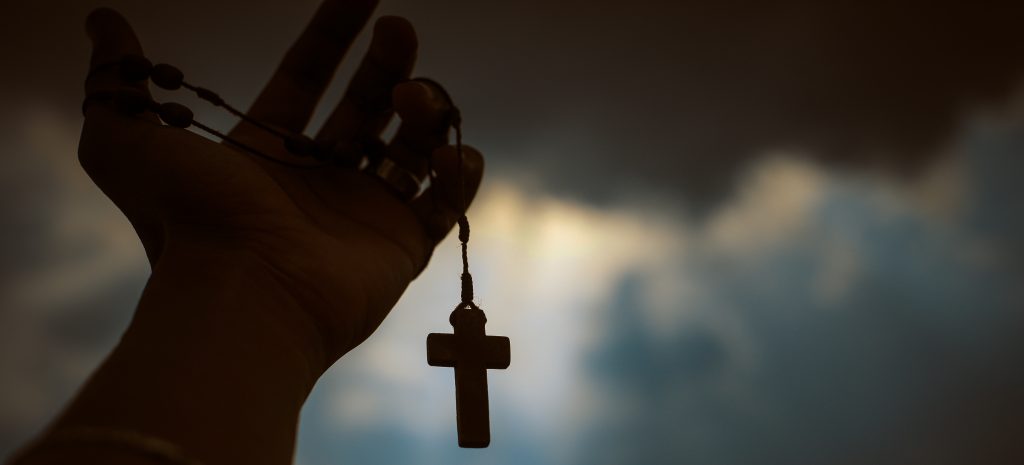
Friends, as followers of Jesus we are to be incarnations of the Incarnation.
The actual invitation of the Christian faith is not just to believe in Jesus or be like Jesus or tell others about Jesus (as right as these thing are), but actually to be the presence of Jesus in the world, our hands his hands, our feet his feet, our heart his heart, our bodies his very body (2 Cor 4.6-12; 1 Cor 2.27). By this does the reality of the risen, living Jesus continue to be displayed, visibly and tangibly, in and around the world (and yours and mine), day after day.
How do you see someone who is invisible? By seeing a real person in whom his Spirit lives. Our vocation as Christians is nothing less than to be incarnations of the Incarnation, for our whole lives in all of our circumstances. We under-appreciate what Christianity invites us to, calls us to, and sometimes asks of us.
In the midst of Holy Week, we must recognize that Jesus, one of the Trinity and YAHWEH, who became flesh, didn’t have to come to earth and he didn’t have to die. The Trinity chose together that he would take on human flesh for the salvation of the world and the revelation of divine love. It was a free and glad choice, even if it meant constant humiliation, severe suffering, and great sacrifice.
And Jesus didn’t have to die (Mt. 23.53). He could have stopped his suffering at any time if there was any other way to achieve reunion with his Father, union with us, victory over death, the forgiveness of the sins of humankind (and yours and mine), and begin the “renewal of all things” (Mt 19.28). He asked for this relief (Lk 22.42, Mt 26.39), but there wasn’t another way, so Jesus decisively chose and committed to a path that would lead to humiliation, bondage, suffering and death, even though he didn’t have to. Jesus conscientiously chose a path that he knew would lead to his death. When he “set his face to Jerusalem” (Lk 9.51-53, Is 50.7), he was choosing a path that he knew where it led. He was choosing truth, love, justice, freedom, and righteousness.
 I often say that the problem with wanting to be Christ-like is when you look at what his life was actually like. The invitation to incarnate the Incarnation is no small thing. Most of the time the billions of incarnations of the Incarnation that happen regularly are somewhat ordinary, actually beautiful but not always noticeable. Sometimes an incarnation of the Incarnation catches the world’s attention.
I often say that the problem with wanting to be Christ-like is when you look at what his life was actually like. The invitation to incarnate the Incarnation is no small thing. Most of the time the billions of incarnations of the Incarnation that happen regularly are somewhat ordinary, actually beautiful but not always noticeable. Sometimes an incarnation of the Incarnation catches the world’s attention.
Knowing what we know about him now, this is the story of Alexei Navalny.
Just days after Ash Wednesday, the whole world caught a vivid and enduring glimpse of the way of Jesus, one we need to see for what it was. If we look at what was put on display on February 16, 2024 in a Russian prison in the Arctic Circle, we’ll understand better what we’re seeing during Christ’s passion, from the Garden of Gethsemane to Golgotha.
Alexei Navalny was the most serious political threat to Vladimir Putin in recent years, and as such had already been on the receiving end of much harassment, ignominy and defamation, threats, wrongful charges, imprisonment, surveillance, and an almost successful assassination attempt in August 2020 by poisoning with the Russian nerve agent novichok. After recovering and convalescing in Germany, Navalny chose to return to Russia on January 17, 2021 to continue his fight for truth, justice, and transparency for the people of Russia. In the Oscar-winning documentary Navalny, a woman on the street exclaims as she’s being arrested at a demonstration, “He’s a good man! He could have left Russia! He didn’t!”
Navalny didn’t have to return to Russia, he could have lived comfortably in exile. But he didn’t. He chose suffering and even death for a greater good.
It was almost guaranteed that he’d be arrested upon return and imprisoned on some trumped up charge, and seemed not unlikely that one way or the other he would be killed by the state. He didn’t have to go, but he chose to, willingly. He went back to Russia to work for freedom for the Russian people, for free and fair elections, for an end to corruption, for an end to killings with impunity, simply for truth and justice’s sake and a better future for millions of people.
Indeed upon arrival he was immediately imprisoned and three years later was killed. I was deeply saddened when I heard of his death on February 16, 2024, but not much surprised.
What did surprise me a day or two after was to learn that Alexei Navalny was a Christian.
His conversion was late and was not a widely publicized part of his life, he didn’t speak of it often, but his life spoke it loudly. I had already admired the man and been inspired by him, and grateful for his hunger for truth and fight for freedom, justice, and flourishing for people, an example for all of us at any time of any worldview. But when I learned he was a Christian, his life and death took on a whole new light and helped me see Jesus.
In his final words during his sentencing on February 21, 2021 before being shipped off to the gulag, Navalny said (from here, actual transcript here)
“If you want I’ll talk to you about God and salvation. I’ll turn up the volume of heartbreak to the maximum, so to speak. The fact is that I am a Christian, which usually rather sets me up as an example for constant ridicule in the Anti-Corruption Foundation, because mostly our people are atheists and I was once quite a militant atheist myself.
But now I am a believer, and that helps me a lot in my activities, because everything becomes much, much easier. I think about things less. There are fewer dilemmas in my life, because there is a book in which, in general, it is more or less clearly written what action to take in every situation. It’s not always easy to follow this book, of course, but I am actually trying. And so, as I said, it’s easier for me, probably, than for many others, to engage in politics.”
Navalny went on to quote the Bible, specifically the Beatitude passage from Christ’s Sermon on the Mount: “Blessed are those who hunger and thirst for righteousness, for they will be satisfied.”…“I’ve always thought that this particular commandment is more or less an instruction to activity,” And so, while certainly not really enjoying the place where I am, I have no regrets about coming back, or about what I’m doing. It’s fine, because I did the right thing. On the contrary, I feel a real kind of satisfaction. Because at some difficult moment I did as required by the instructions, and did not betray the commandment.”
In prison, he asked for a New Testament and a Psalter.
Prior to 2021 Navalny’s public comments about his faith were few, like from here where he explains why his faith didn’t factor much into his public persona:
“As for the church and religion: I’m ashamed to say that I’m a typical post-soviet believer – I observe the fasts, I cross myself when I pass a church, but I don’t actually go to church very often. When my friends make fun of me for ordering a vegetable salad ‘because it’s a fast day’, and cross-examine me about the meaning of this or that fast, I soon find myself out of my depth, and they mock me as a ‘sham orthodox, who doesn’t know a thing about his religion’. It’s true, I don’t know as much about my religion as I would like to, but I’m working on it.
I don’t think I could make political capital out of my religious faith – it would just look silly. I don’t advertise my belief and I don’t hide it either; it’s just there, that’s all. I am a believer; I like being a Christian and a member of the Orthodox Church, I like to feel part of something large and universal.”

Alexei Navalny was no perfect saint, none of us are. But being a saint is not a prerequisite for trying to be like Jesus in whatever our sphere of influence is, recognizing that as we do our best to follow him with his Spirit inside of us that somehow it’s him who is being revealed through us, and somehow his work of continuing to reveal divine love and making wrong things right is getting done.
Navalny joins the likes of Stanley Rother, Maximillian Kolbe, Mary Dyer, Miguel Pro, Dietrich Bonhoeffer, the Monks of Tibhirine, and many others lesser known who made decisions for what is right for Christ’s sake that might likely lead to death and did, and by doing so present vivid examples of what God’s sacrificial, self-giving love looks like and does. They incarnated the Incarnation all the way to death. Their witness witnesses to Jesus and speaks to us.
But Holy Week is not about Navalny, it’s about Jesus, but this year Navalny helps us appreciate Jesus all the more.
Our Jesus chose to endure humiliation, shame, suffering, and a horrible death so that we could know and be divine love, so that we could take up our crosses and follow him and reveal him. The Christian life is actually that simple.
This week, let us appreciate our vocation to reveal Jesus in the world in the circumstances that are given to us, inspired by watching Jesus, who didn’t have to do it, do it. Jesus did it for love. Jesus did it for you. Jesus did it for all of us. Jesus did it for everyone. Jesus did it for the whole world.
Brothers and sisters, let us contemplate Jesus, and love him, and ask for the grace to let him live more fully through us. That’s a good posture for Holy Week.

From Rich Dean: “I met Alexei Navalny years ago at a lawyers‘ conference when he was getting his start as a shareholder activist and critic of abuse by corporate insiders in major Russian companies. Over time, as Vladimir Putin’s power and political repressions grew, Navalny began focusing on public corruption, particularly that of Putin and his close allies. It was his skill at exposing this extensive corruption that set him directly against the most powerful people in Russia. I only learned recently of his faith in Christ and have been deeply moved by his understanding and application of Matthew 5:6, which we usually read as “Blessed are those who hunger and thirst for righteousness…”. But the Greek word for “righteousness” can also be translated as “justice”. For Navalny this verse was more than a deep desire; it was, in his own words, a call to action. His confidence in these words undergirded his willingness to challenge a profoundly corrupt and unjust Russian leadership in the name of God’s justice. He saw his life and work so rooted in God’s justice that he could risk it all in service to our Lord Jesus whose death and resurrection we celebrate this week.”
